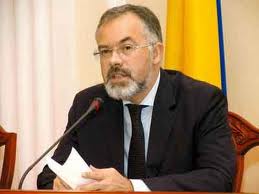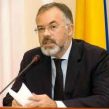
Ukrainian Education Minister Tabachnyk Confirms His Russian Nationalist Credentials
Publication: Eurasia Daily Monitor Volume: 7 Issue: 177
By:

Education Minister, Dmytro Tabachnyk, in Ukrainian Prime Minister, Nikolai Azarov’s, government has always been a controversial figure because of his antagonistic views towards Western Ukrainians, Ukrainian nationalism and his pro-Russian view of history. Valery Khoroshkovsky continues to remain in his position as the Chairman of the Ukrainian Security Service (SBU) despite continually embarrassing President Viktor Yanukovych (EDM, September 23).
The appointments of Tabachnyk and Khoroshkovsky both negatively impacted on President Yanukovych’s international and domestic image. The fact that they remain in place is evidence that Russia was able to implement its demand to influence cabinet appointments in the Siloviki and humanities fields in exchange for support for Yanukovych in the 2010 elections. These demands were outlined in President, Dmitry Medvedev’s, August 2009 open letter to the then President Viktor Yushchenko (https://korrespondent.net, August 9, 2009).
Tabachnyk’s latest attacks on Ukrainian nationalism (https://2000.net.ua/2000/aspekty/amplituda/68928) was too much for Petro Pysarchuk, the Party of Regions candidate for Lviv Mayor in the October 31 local elections, who had drafted a parliamentary resolution for the ministers dismissal. “Tabachnyk has no authorization from the congress or the political council of the Party of Regions to be its ideologue,” Pysarchuk stated (Ukrayinska Pravda, September 22). Tabachnyk’s latest attack on Galicians would be a private affair, Pysarchuk says, if not for the fact that he is a sitting cabinet official. Pysarchuk points out that not all Galicians are “nationalists”. However, they are united in their loathing of Tabachnyk, adding that “it is without sense that Dmytro Volodymyrovych is seeking to collect arguments to denigrate Lviv as its Ukrainian spirit could not be destroyed over the centuries by many powerful colonizers.”
During the Viktor Yushchenko presidency (2005-2010) Tabachnyk regularly attacked Ukrainian nationalism, which he associated with the “Orange” leaders, Viktor Yushchenko, Yulia Tymoshenko, and Galicians. Tabachnyk perceives himself in the role of a Soviet era ideological secretary, for example, in his visceral denunciations of Ukrainian nationalists in the 1940’s, which positions him close to the Communist Party and neo-Soviet wing of the Party of Regions. Tabachnyk has banned the use of “World War II” from textbooks in favor of the “Great Patriotic War” (ignoring the 1939-1941 Nazi-Soviet collaboration) (Ukrayinska Pravda, April 12).
In his “what kind of textbooks should we use?” argument, Tabachnyk asserted that “Stepan Bandera and Yuriy Shukhevych will remain in history as nationalists and organizers of mass murder and will forever be stained by the brush of collaborationism” (www.partyofregions.org.ua, June 4). Tabachnyk used traditional Soviet discourse to describe the Orange camp as “national-radicals” and “nationalists” rather than “democrats” and “patriots.” Tabachnyk rejected the term “national democrat” as a contradiction in terms, “a euphemism, like ‘national socialism,’ which masks the ‘core-nationalistic’ substance of this trend” (Rossiiske Vesti, October 28, 2006).
Tabachnyk has pursued two commonly held Russian nationalist positions. First, Galicians are not really “Ukrainians” and that they are different from Ukrainians living in central and eastern Ukraine. “Galicians have virtually nothing to do with the people of Great Ukraine mentally, confessionally, linguistically or politically. We have different enemies and different allies. Furthermore, our allies, and even brothers are their enemies, and their ‘heroes’ (Stepan Bandera, Yuriy Shukhevych) are for us murderers, traitors and accomplices of Hitler’s executioners,” Tabachnyk asserts. Moreover, Tabachnyk claims it is misplaced for the US and Europe to see the Orange Revolutionaries as “democrats; in reality, they are ‘Ukrainian nationalists.” Tabachnyk, like the Russian leadership and the Yanukovych administration, believes democratic revolutions were CIA conspiracies and the 2005-2010 Yushchenko administration received its orders from the US embassy (D.Tabachnyk, “Utynyi sup” po-Ukrainski. Kharkiv: Folio, 2008).
US conspiracy theories have proved popular among post-Soviet leaders and led to steps in Ukraine and Russia (where were successful) to introduce legislation limiting Western funding for NGO’s. Tabachnyk, like many in the Yanukovych administration, sees Western criticism of democratic regression, such as censorship, as the work of Ukrainian NGO’s funded by Western grants to slander the Ukrainian authorities. “Freedom of speech in their understanding (‘independent media’ and ‘Stop cenzura!’) is the freedom of the opposition to lie about everything about the authorities,” Tabachnyk suggested (https://2000.net.ua/2000/aspekty/amplituda/68928).
Former President, Leonid Kuchma, and Parliamentary Chairman, Volodymyr Lytvyn, both continue to point to the Georgi Gongadze murder scandal in the fall of 2000 as a US conspiracy (Ukrayinska Pravda, September 15). This prompted a strong rebuke from US Ambassador John Teft (Kyiv Post, September 22). Tabachnyk’s latest diatribe “Spiritual Capitulation of Ukrainian Nationalists” (https://2000.net.ua/2000/aspekty/amplituda/68928) was published in his favorite newspaper, 2000, established by “former” KGB officer, Sergei Kychygyn, who as Communist Party commissar at the Vechirnyi Kyiv newspaper, specialized in vitriolic attacks on dissidents and NGO’s. The newspaper has specialized in Soviet-style denunciations of the opposition as American hirelings and of “Ukrainian nationalism.” Political expert Mykola Riabchuk described 2000 to Jamestown as “an openly [Russian Federal Security Service] FSB product in Ukraine.” Their main agenda seeks to belittle support for Ukrainian nationalism. Tymoshenko’s main mistake was that after her defeat she began to rely on nationalistic rhetoric. “Nationalist forces” do not have any serious support among Ukrainians and cannot return to power because they discredited themselves during Yushchenko’s presidency.
Therefore, “nationalists” seek to retain power over a small part of Ukraine by separating Western Ukraine or expelling the Donbass and Crimea. This is a reference to Ukrainian writer Yuriy Andrukovych who in an interview in UNIAN (July 22) and Rzechzpospolita (August 1) triggered a major debate when he suggested that if “Orange” forces returned to power, and Donetsk or Crimea again raised the question of separating (as they did at the Severdonetsk congress on November 27, 2004 in response to the Orange Revolution) they should be allowed to leave (Ukrayinska Pravda, August 4, 5, 10, 30, UNIAN, July 29).
Tabachnyk alleges that “nationalists” now represent a threat to Ukraine’s territorial integrity. “Individuals from Ivano-Frankivsk seek to separate these regions where their ‘real’ nation lives and to build a state using apartheid and ethnic cleansing techniques” (https://2000.net.ua/2000/aspekty/amplituda/68928).
Tabachnyk’s latest denunciation of Ukrainian nationalism represents a set of inter-connected ideas, bad analogies and groundless accusations. Such an article would be intellectually ridiculed if written by an education minister within a Western democracy. Yanukovych’s support for his education minister is evident in his September 30 decree establishing a Committee on Questions of Educational Quality, which Tabachnyk will head (www.president.gov.ua).The fact that Tabachnyk and Khoroshkovsky remain in influential positions, despite embarrassing the president, is evidence that Moscow retains large influence over the Yanukovych administration.




